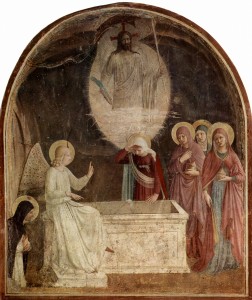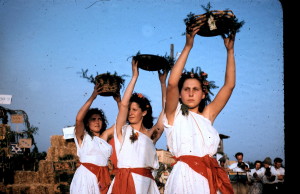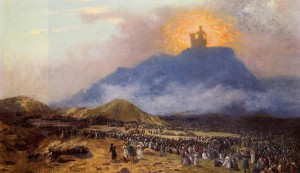Today is the first day of the omer. Actually, it began last night.
Beginning with the second day of Passover, Jews begin counting the days. For 7 weeks they count, 49 days. This is called “Counting the Omer,” laid out in Leviticus 23:15-17. The omer was a measure of grain, an offering of thanksgiving for the freedom of Pesach. On the second day of Pesach, an omer of barley was brought to the Temple as an offering. The counting culminates with day 50, which is the holiday of Shavuot, the Festival of Weeks, the holiday of Pentecost. Shavuot is a like a Hebrew Thanksgiving, and on this day, two loaves made of wheat were offered in the Temple. Jews don’t go to the Temple today, because there is no Temple right now; but they still offer prayers and thanksgiving to God for all that he’s given us. Many decorate their homes and synagogues with greens and flowers, to remember the harvest. Some stay up all night studying Torah. And they read the Ten Commandments in the morning service.
In Jewish tradition, Shavuot is when God gave the Torah to Israel at Mount Sinai, and Israel became a nation, rather than just a bunch of refugee slaves escaped from Egypt. If Pesach is the holiday of chaos and questions and upheaval and dramatic miracles (and it is), then Shavuot is a holiday of fulfillment. And so Jews count the days between Pesach and Shavuot, and they pray each day, and wait for the fulfillment of the promise.
Tony Campolo popularized the line in his famous sermon, “It’s Friday, But Sunday’s Coming.” He tells the story of an old, black preacher from the church he grew up in, who delivered a simple sermon with a profound message:
It was Friday. It was Friday, and my Jesus is dead on the tree. But that’s Friday. Sunday’s a-comin’.
Friday. Friday Mary’s cryin’ her eyes out. The disciples are runnin’ in every direction, like sheep without a shepherd. But that’s Friday. Friday. Sunday’s a-comin’!
Friday. Friday, those are looking at the world and saying, “As things have been, so they shall be. You can’t change nothing in this world! You can’t change nothing in this world!” But they didn’t know, it was only Friday. Sunday’s a-comin’!
Friday! Friday, them forces that oppress the poor and keep people down, them forces that destroy people, them forces is in control, and them gonna rule. But they don’t know, it’s only Friday! Friday!
But Sunday’s a-comin’!
In Tony’s retelling of the story, the old preacher went on for an hour and a half, riffing off that one line: “It’s Friday, but Sunday’s a-comin’.” It was inspirational. It was salvation personified. It was peace, love, and miracles.
“And the Spirit of God that possesses us,” Tony concludes, “will motivate us to give ourselves to those who are suffering in a way that we have failed to do up to this day.”
When God meets our needs, and we bring our offerings of thanksgiving to him, it overflows into the world around us and brings salvation to the needy around us.
In other words, it ain’t Sunday’s a-comin’.
After Yeshua’s resurrection, he told his followers, “I am going to send you what my Father has promised; but stay in the city until you have been clothed with power from on high.”
Sunday had come and gone. And they were left in suspense, with only a promise.
And so they counted the days. And they prayed. And they waited for the fulfillment of the promise. For 49 days after Passover, they counted, and prayed, and waited.
As Shavuot approached, many Jews from the Diaspora came to present their offerings for the Festival of Weeks in the Temple. So at this time there were many Jews from all around the world staying in Jerusalem. Then on the day of Shavuot, suddenly they heard the roar of wind, like a tornado blowing through the house where they were praying. And what looked like tongues of fire separated and came down on each of them. And the Ruach Hakodesh filled them, and they went out into the street and began speaking to the gathering crowd, in all the different languages of all the Jews that had gathered from the different countries from which they had come.
When the Israelites reached Mount Sinai, in Exodus 19, there were roarings of thunder, flashes of lightning, and the presence of God descended on the mountain in a cloud of smoke. And Moses climbed the mountain, for the people; and God spoke to the people, through Moses; and he gave them the Torah.
But now, says Peter, what God promised the prophet Joel, it has come true: “I will pour out my Spirit on all flesh. Your sons and your daughters will prophesy. Your old men will dream dreams. Your young men will see visions. And on my servants and on my handmaidens I will pour out my Spirit.”
Because in that Shavuot after Yeshua’s resurrection, his followers made their own journey up Mount Sinai.
Climbing Sinai is a fundamentally transforming event.
As Paul Harvey once put it, ‘You can always tell when you’re on the road to success; it’s uphill all the way.’
We all grow up automatically. But growth, you have to be intentional about that.
Rabbi Yisroel Salanter, who was one of the great figures of the 19th-century Musar movement, he noted, ‘It’s easier to learn the entire Talmud – than to change even one character trait.’
That kind of growth only comes after years of learning, and trying, and even failing…
I think as Christians we often forget that Pentecost requires a climb, “uphill all the way,” up the Mountain of God. We forget that God’s grace requires our participation; that we are called by God’s Spirit to become more than we are, and our natural inclination is to fight this process every step of the way; that we need to be taught how to ask hard questions, and seek honest answers; that we must give ourselves to those who are suffering, if we expect God to be able to use us to alleviate their suffering. The bomb does not defuse on its own.
As Christians, we often focus on Yeshua’s redeeming sacrifice, and on his resurrection, in which the Apostle Paul said we would be united with him and which is a key aspect of our faith in him.
So you can imagine how important was this litany when Paul recited it to the Corinthians: “For what I received I passed on to you as of first importance: that Christ died for our sins according to the Scriptures, that he was buried, that he was raised on the third day according to the Scriptures.”
“But,” he continues, “by the grace of God I am what I am. His grace which was given to me was not futile, but I worked more than all of them; yet not I, but the grace of God which was with me.”
This is the journey from Pesach to Shavuot, from Passover to Pentecost.
(Adapted from Walking in the Moment between Tick and Tock: From Passover to Pentecost.)


